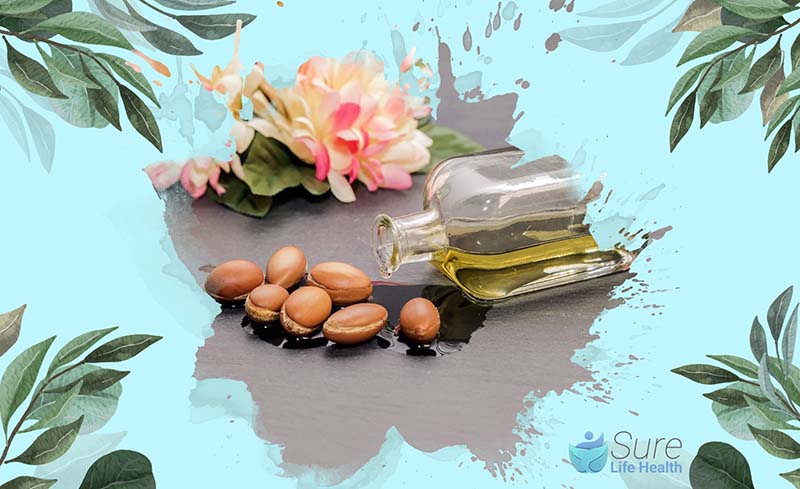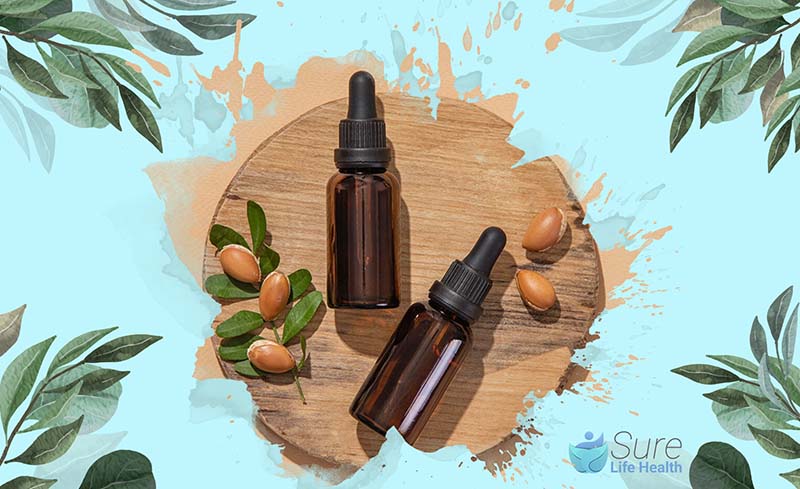“Does argan oil grow hair?” Argan oil, commonly hailed as “liquid gold”, holds a prestigious place in Moroccan tradition and has gained international acclaim as a vital beauty product.
It’s celebrated for its numerous benefits, especially for its potential to promote hair growth. In the following sections, we’ll explore the extensive advantages of argan oil for hair, underscoring why it’s become a must-have in beauty routines worldwide.
Does Argan Oil Grow Hair?
Argan oil is packed with essential fatty acids such as oleic, linoleic, and palmitic acids. These nutrients are crucial for hair growth as they deeply nourish both the hair and scalp. They stimulate blood circulation to the hair follicles, which is essential for promoting hair growth and preventing hair loss.
Rich in vitamin E, argan oil boasts potent antioxidant properties that safeguard the hair from environmental stressors and damage caused by free radicals. This protection is vital for maintaining healthy hair growth and reducing breakage.
Additionally, argan oil contains plant sterols, which are known to alleviate inflammation and irritation on the scalp. This is particularly beneficial for individuals suffering from scalp conditions like psoriasis or eczema, making argan oil a soothing choice for scalp health.

3 Benefits of Using Argan Oil on Your Hair
Argan oil is infused with fatty acids and potent antioxidants like vitamin E, offering numerous benefits for both scalp and hair health. Here are three key advantages of incorporating argan oil into your hair care routine:
Argan Oil Can Reduce Scalp Dryness
Argan oil effectively reduces scalp inflammation, addressing common issues such as dandruff, itchiness, and flakiness.
Its hydrating properties deliver deep moisturization without clogging pores, promoting a healthier scalp environment.
Argan Oil Aids in Combating Frizz and Frizzy Hair
Thanks to its rich content of fatty acids and vitamin E, argan oil is excellent for smoothing down the hair cuticle.
This action helps to control frizz and flyaways, enhancing the hair’s shine and smoothness. The result is hair that is easier to style and manage, maintaining a sleek, polished look.
Argan Oil Can Help Prevent Split Ends
Argan oil improves hair elasticity and provides vital moisture, which can help prevent the formation of split ends.
Regular application of argan oil to the tips of your hair can reduce breakage and keep ends looking healthy and well-maintained.

Use Argan Oil Daily for Your Hair: Should You?
Argan oil can be used daily on your hair, but the key is moderation, especially if you have fine or thin hair. Start with a small amount of oil, and increase as needed to avoid weighing your hair down or leaving it looking greasy.
Opt for a lightweight formulation of argan oil to ensure it absorbs quickly and doesn’t leave a heavy residue.
If you notice your hair becoming oily between washes since introducing argan oil, consider applying it only to freshly washed hair. Alternatively, experiment with using smaller quantities. This adjustment helps you maintain the oil’s benefits while keeping your hair fresh and voluminous.
Integrate Argan Oil into Your Hair Care Routine
If you’re keen to unlock the benefits of argan oil for your hair, there are several effective ways to incorporate it into your routine:
Argan Oil Hair Mask
Creating your own argan oil mask is straightforward and economical. Use pure argan oil for maximum benefits, as it can be used alone or blended with other beneficial oils like coconut or castor oil.
Here’s how:
- Massage 8 to 10 drops of argan oil into your hair and scalp, adjusting the amount based on hair length.
- Continue massaging for about 10 minutes to ensure coverage from roots to ends.
- Wrap your hair in a towel or hair wrap and leave it overnight.
- Wash your hair in the morning and style as usual.

Shampoo
While argan oil-infused shampoos are available for purchase, adding argan oil to your regular shampoo is a simple alternative:
- Add one or two drops of argan oil to the shampoo in your palm.
- Mix well by rubbing your hands together.
- Apply to your hair, then wash and rinse as usual.
- Use this enhanced shampoo every two to three days.
Leave-In Conditioner
Argan oil can replace traditional conditioners as a leave-in to minimize breakage during combing and styling:
- After washing, towel-dry your hair so it’s slightly damp.
- Rub two to three drops of argan oil between your hands and apply to your hair.
- Dry and style your hair as usual.
- Apply once or twice a week for best results.
Styling Product
Utilize argan oil as a styling aid to smooth your hair and reduce frizz, while also protecting it from heat damage:
- Dispense one or two drops of argan oil into your palm.
- Rub your hands together and lightly apply to clean, dry hair, avoiding the scalp to prevent greasiness.
Potential Hair Benefits of Argan Oil
Argan oil is highly praised for its impressive nutrient profile, which offers numerous benefits for hair health. Here’s a breakdown of how argan oil can positively impact your hair:
- Fatty Acids in Argan Oil: Predominantly consisting of linoleic and oleic acids, argan oil provides intense hydration. These fatty acids help maintain moisture in the hair and protect against damage from free radicals, keeping your hair strong and resilient.
- Vitamin E and Antioxidants: Argan oil is rich in vitamin E, a powerful antioxidant that prevents dryness of both the scalp and hair. It reduces frizz, aids in detangling, and minimizes breakage, promoting overall hair strength and vitality.
- Anti-inflammatory Properties: The scalp, like any part of the body, can suffer from inflammation. Argan oil’s high antioxidant content may help prevent or improve scalp conditions that lead to hair loss, such as seborrheic dermatitis and psoriasis. Its soothing properties can calm scalp irritation and contribute to a healthier hair growth environment.
- Protection from Sun Damage: Exposure to the sun’s harsh rays can be damaging to the hair. Argan oil’s antioxidant properties shield the hair from UV damage, helping to prevent dryness and maintain the integrity of the hair shaft.
- Protection Against Styling Damage: Frequent styling with heat tools, chemical treatments, and harsh products can lead to significant hair damage. Argan oil creates a protective nourishing layer around each hair strand, mitigating the effects of styling and chemical processes. This protection helps to strengthen hair that has been weakened, promoting healthier growth and reducing the likelihood of hair loss.

Is Argan Oil Safe for Your Hair?
Argan oil is generally considered safe and beneficial for use on hair. This natural oil is derived from the kernels of the argan tree and has become a staple in many hair care products due to its enriching properties. It is effective for all hair types, including colored or chemically treated hair, and is revered for its nourishing effects.
While argan oil is suitable for most hair types, it’s important to use it judiciously if you have very fine or oily hair to avoid a greasy look. The key to maximizing the benefits of argan oil is to opt for a high-quality, pure oil.
Check the ingredient list to confirm purity and ensure that the product does not include additional oils or substances that might diminish its effectiveness.
When used in moderation, argan oil can significantly enhance hair health, making it a valuable component of your hair care regimen.
Conclusion
Argan oil is an exceptional natural product that deeply moisturizes both your hair and scalp, providing protection from daily wear and tear. It reduces breakage and split ends, and by maintaining a healthy scalp, it may also prevent hair loss.
Incorporating argan oil into your hair care routine can lead to thicker, fuller hair, raising the question: Does argan oil grow hair? This highlights the oil’s multifaceted benefits for overall hair health and vitality.
Now, we want to hear from you! Share your own experiences and stories with us in the comments below. And don’t forget to explore more insightful blogs on nail care and health from Sure Life Health. Keep nurturing those nails with vitamin E, and watch them flourish!
Professor Gaye Cunnane, PhD, MB, FRCPI
As the Director of Health and Wellbeing at RCPI, Professor Gaye Cunnane is at the helm of initiatives aimed at enhancing the health and well-being of RCPI Trainers and Trainees. Her role extends beyond administration; she is also a respected clinical professor of rheumatology and a consultant rheumatologist at Trinity College Dublin (TCD) and St James’s Hospital. Prof. Cunnane’s medical journey began at TCD, where she graduated from medical school, and her path has been marked by both clinical and academic excellence.
After completing her basic clinical training in medicine, she embarked on PhD studies at University College Dublin and St Vincent’s University Hospital. Her research during this period was focused on prognostic markers in early inflammatory arthritis, a project that saw her collaborating with esteemed universities across Europe, including in Switzerland, The Netherlands, the UK, and Sweden.
Prof. Cunnane’s career took her to the University of California, San Francisco, where she spent three years delving into research on new treatments for lupus. Her academic prowess led her to the University of Leeds in 2001 as a senior lecturer, before returning to Ireland in 2003 to assume her current roles. She has also served as the National Specialty Director for Rheumatology training in Ireland, Programme Director for Basic Specialist Training with RCPI, and as a past President of the Irish Society for Rheumatology.
PUBLISHED ARTICLES
“Rheumatic disease differentiation using immunoglobulin G sugar printing by high-density electrophoresis”: Published in The Journal of Rheumatology, this study reflects her in-depth investigation into rheumatic diseases.
“Benefits of exercise in patients with rheumatoid arthritis: a randomized controlled trial”: This research work, highlighting the positive impact of exercise on rheumatoid arthritis, underscores Prof. Cunnane’s dedication to practical, patient-centered research.
Additionally, Prof. Cunnane has made notable contributions to the Annals of the Rheumatic Diseases, discussing early referral, diagnosis, and treatment of rheumatoid arthritis. She has also been involved in a study on the NCBI platform investigating exercise benefits in rheumatoid arthritis patients.
Professor Gaye Cunnane’s career is a testament to her commitment to improving patient outcomes in rheumatology through rigorous research, clinical excellence, and dedicated teaching. Her work continues to influence the field of rheumatology, both in Ireland and internationally.

